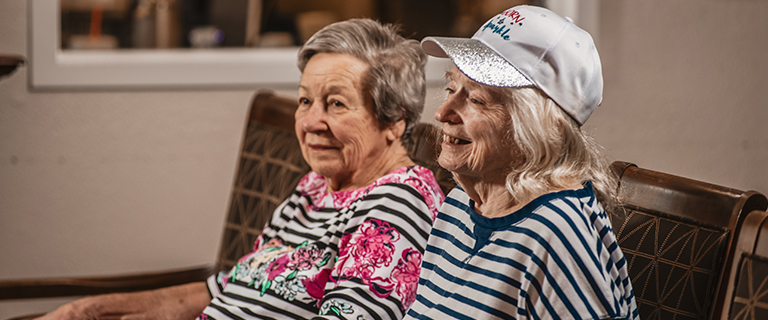For seniors, staying connected is about so much more than passing the time. Social activity promotes better cognitive health, helping seniors stay sharp and engaged throughout their daily lives.
Whether it’s weekly calls with loved ones or participating in a knitting club, social interaction plays a vital role in overall wellness. Yet, many seniors experience challenges that make socialization harder. This is why community becomes so important as we enter our golden years.
Why Socializing is Vital for Seniors
Social interaction is one of the building blocks of a healthy mind and body. Unfortunately, many older adults experience isolation and loneliness, often spending long stretches without meaningful interaction.
The effects of isolation go beyond feeling sad. Extended periods of social withdrawal can lead to:
- Depression
- Heightened anxiety
- Changes in appetite
- Difficulty sleeping
- Cognitive decline
However, even simple interactions with family, friends, and peers can work wonders. Regular social activities can improve mental health, boost immunity, enhance physical health, and most importantly, keep the brain sharp and active. By staying connected, seniors not only nurture their social bonds but also help their cognitive abilities thrive.
Staying Social Can Mean Better Cognitive Health
Every conversation we have is a mental workout. Even the simplest conversations involve essential skills we may not even realize we’re using! For seniors, this means that regular social activity can keep the brain healthier for longer.
Here are some of the skills that socialization can improve:
- Memory Boost: Sharing stories or remembering past conversations keeps the brain engaged.
- Staying Sharp: Paying attention during a conversation helps maintain focus and cognitive skills.
- Understanding: Processing what others say strengthens critical thinking.
- Problem-Solving: Discussions spark new ideas and perspectives, keeping the mind active.
Research even shows that staying social can protect the brain and slow down cognitive decline. Just like how lifting weights can make you stronger, think of conversations as training your brain. Whether it’s catching up with family or joining a group chat, seniors get to stay mentally sharp while building connections and creating meaningful moments.

Barriers Seniors May Face When Socializing
If staying socially active is so beneficial, why do many seniors find themselves disconnected? It’s often due to real obstacles that make interacting with others daunting or even nearly impossible.
Common barriers seniors face include:
- Physical difficulties: Mobility limitations can make it challenging to attend outings or meet-ups.
- Sensory impairments: Issues like hearing loss or poor eyesight may cause discomfort or self-consciousness in group settings.
- Fear of rejection or shyness: Anxiety about joining new groups or re-starting social routines can hold seniors back.
- Limited access to social opportunities: Some seniors may live in locations where social activities and events are less accessible.
These barriers can create patterns that are hard to break. The more isolated someone becomes, the more overwhelming socializing can feel, which perpetuates the cycle of loneliness. That’s why proactive encouragement and thoughtful solutions are so important in helping your loved ones rediscover a sense of connection.
Supporting Your Loved One’s Social Life
Helping a senior loved one reconnect with others starts with open, caring conversations. Take the time to really listen to how they feel about socializing and what might be holding them back. A supportive chat can help them identify challenges, so that—together—you can start thinking about solutions.
Here are a few questions you can ask to better understand what’s going on:
- What’s making it harder for them to connect with others right now?
- Are there any groups or activities they’d like to try?
- How do they feel about picking up new hobbies?
- What kind of environment would make them feel the most comfortable?
- Would they feel better if you went along to events or activities with them at first?
Once you’ve had this conversation, look for simple ways to help them ease your loved one back into socializing:
- If they’re worried about getting around, arrange transportation that works for their needs.
- If they’re feeling shy, offer to join them for an activity or event until they feel settled.
- If they’re dealing with sensory issues like hearing loss, find quieter, smaller groups they can enjoy.
- If they’re curious about hobbies, check out local classes or clubs they might like.
The goal is to help your loved one take small steps back into social settings and create an environment where they feel safe and valued. Encourage them, stay flexible, and remember that patience goes a long way.
Socialization goes far beyond making connections; it provides a pathway to better cognitive health and an enhanced quality of life.
Discover the Joy of Connection
When seniors have the opportunity to build friendships and stay active, life takes on a whole new vibrancy. At Parsons House La Porte, we pride ourselves on fostering a warm, welcoming environment where seniors can participate in engaging activities, group outings, and meaningful conversations every single day.
From group exercise classes to dynamic discussion groups and shared meals with friends, we’ve curated a community where meaningful connections flourish. Here, your loved one can thrive socially while also reaping the health benefits of staying connected. Book a tour today and see how we combine care, compassion, and connection to create a truly uplifting experience for seniors. Their next chapter is full of friendships and laughter just waiting to unfold.



